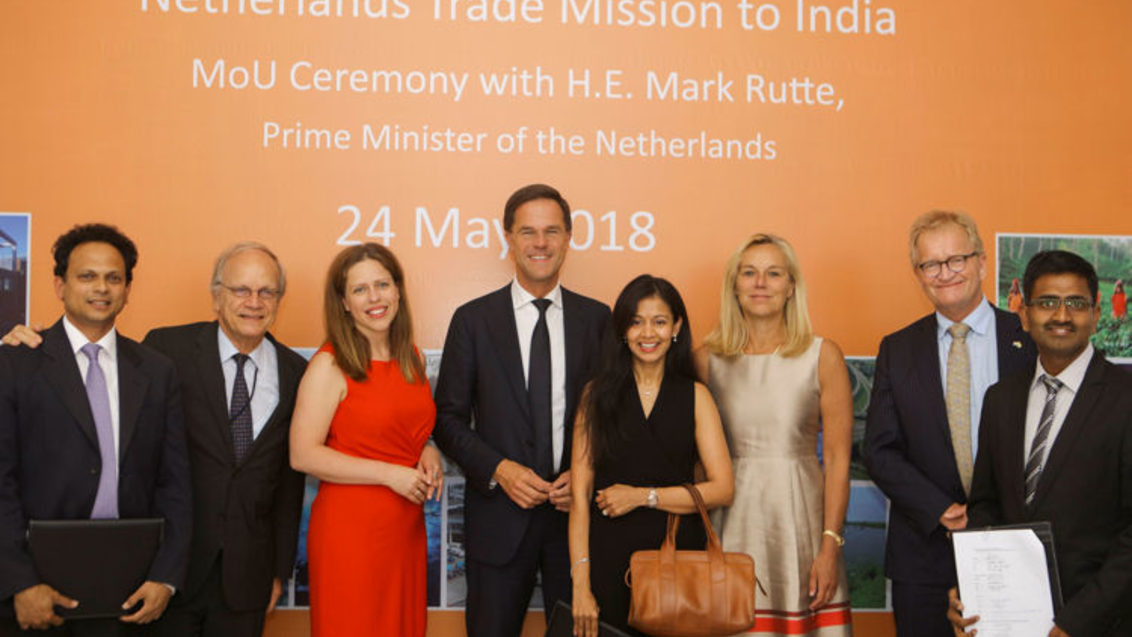When meeting our AIMS means going Dutch

Smallholders in many parts of India face severe problems with water. Much of the country’s agriculture depends heavily on irrigation. But India has been over-using its groundwater for many years. (That’s one reason we’re examining smarter subsidy policy there).
Syngenta Foundation India continues to tackle this vital issue from various angles. Our latest initiative is AIMS: the Adaptive Irrigation Model for Small Farmers. We recently signed the relevant agreement with Wageningen Environmental Research, a branch of the world-famous Dutch university, and with AgriRain, a specialist company based in Hyderabad. The signing took place during a Netherlands Trade Mission to India. The Dutch attach great importance to these bilateral activities: The Prime Minister, Mark Rutte, attended in person.
“We’re delighted to be working on AIMS with such a prestigious academic institution and the private sector”, says Baskar Reddy, the Executive Director of Syngenta Foundation India.
So what is this about?
Baskar explains the background: “What we call ‘regulated deficit irrigation’ (RDI) improves water-use efficiency. Put another way: farmers get more crop per drop.” That productivity rise is particularly valuable in drought-prone areas. But as Baskar points out, “RDI requires precise knowledge of crop response to water”. Drought tolerance varies considerably by species, cultivar and growth stage. Keeping accurate track of all the differences can be challenging. So there is a need for alternatives.
‘Hose-reel irrigation’ is a custom-hire service model. An agri-entrepreneur can own and operate the system, serving local farmers for a fee. Wageningen Environmental Research and an irrigation company ran their India Water Initiative from 2014-2016. Together they developed a prototype tractor-drawn hose-reel irrigation service. Water came in tankers from nearby sources, for targeted application by agri-entrepreneurs.
So far, so good. But now AIMS aims to take a closer look.
“We have three main objectives”, says Baskar Reddy. “One is verification and quantification of this prototype’s socio-economic benefits and return on investment. We’ll be measuring those in a specific example: groundnuts in the Anantapur district of Andhra Pradesh.” The partners will also evaluate integration of the hose-reel machines with data collection via handheld devices like smartphones. “We hope this will enable development of decision-support tools that benefit smallholders”, adds Baskar. The third aim of AIMS is to investigate the efficiency of micronutrient application in combination with deficit irrigation.
--------------------------------------------------------
Who's in the picture on AIMS? From left to right, they are:
Kalyan Guntuboyina, Senior Fellow and Team Lead for the Joint Research Project with AgriRain and us
Alphonsus Stoelinga, Netherlands Ambassador to India
Carola Schouten, Deputy Prime Minister of the Netherlands and Minister for Agriculture, Nature and Food Quality
Mark Rutte, Prime Minister of the Netherlands
Neha Malladi, Director, AgriRain
Sigrid Kaag, Netherlands Minister for Foreign Trade and Development Cooperation
Hans de Boer, President of the Confederation of Netherlands Industry and Employers (VNO-NCW)
S Baskar Reddy, Executive Director, Syngenta Foundation India
